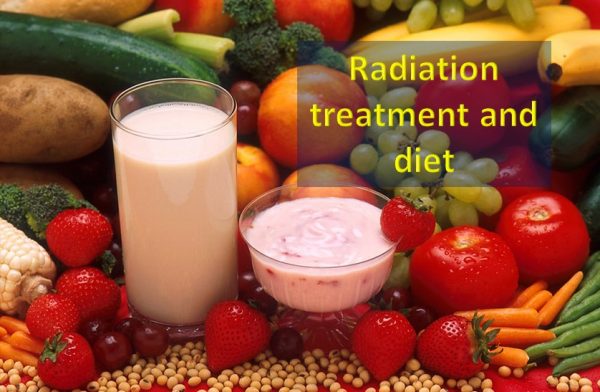
Radiation treatment and diet
Depending on cancer stage, position of tumor and type of cancer, people with cancer might receive chemotherapy or radiation therapy or both.
Radiotherapy helps to shrink the tumor and to kill cancer cells. It slows growth of the tumor. When radiation is given, healthy tissues around the radiation area may get destroyed. Radiation treatment involves delivering high doses of radiation to cancerous tumors. Beams of radiation will pass through the skin and target tumor. It damages the DNA of the cancer cells, causing cancer cells death. Radiation treatment is painless. However, it could result certain side effects leading to loss of vital nutrients and the strength.
During radiation and after radiation treatment, taking care of proper diet and bringing immune system to normalcy is critical for cancer patients. For this focus should be given to nutritious diet and choice of food. Healthy eating helps to recover from the sickness. Most importantly body needs good calorie and protein intake to maintain health and to regenerate new tissues. This will help to reduce impact of radiation side effects.
Side effects of radiation:
- Mouth sores and throat issues: Irritation of mouth lining, throat and gums area common side effects of radiation. This will make it hard to eat and swallow any foods. Soft and easy to chew food makes it easier to get the nutrients that patient needs. Liquid foods – sauce, broth, soup, soft bread, soft rice, porridge, sucking ice chips and foods served at room temperature might feel good.
- Stomach bloating: Fluid retention and gas results in stomach bloating. Patient might experience bowel edema. Patients must avoid eating beans, broccoli, cauliflower, cabbage, leafy green vegetables – that cause bloating. Soda and carbonated beverages are not good either. Best is to opt for lower dietary fiber foods.
- Diarrhea or constipation: Bowel habit change is common in cancer patients. Radiation results in irregular bowel movement. It could either cause diarrhea or constipation. In case of diarrhea, patient tend to lose lot of essential nutrients. Constipation can results in loss of appetite and loss of taste and in turn food intake reduces causing weight loss. Increasing or avoiding dietary fiber food intake, or changing diet based on patient condition will help.
- Other side effects: Nausea, vomiting, Lack of appetite, dehydration and weight loss.
Diet change during and after radiation treatment involves changing to bland diet. Avoiding spicy food is strongly suggested. Stock up health, nutrient foods and making changes in food habits to avoid further complications.
Protein: Protein helps repair body tissue and good immune system. Additional (extra intake) protein (especially if the patient undergone surgery, chemotherapy and radiation. Good protein includes – soy foods such as soymilk, tempeh, edamame, tofu, protein shake, protein powder, protein biscuits, lentils, beans, dairy products – yogurt, cheese, milk.
Carbohydrates and Fats: Most calories come from carbohydrates an fat to maintain weight. This include all types of fruits, starchy vegetables like potato, sweet potatoes, corn, cereals, beans, grains (oatmeal, quinoa, rice, wheat), honey, nuts, omega-3-fatty acids etc.
Vitamins and Minerals: For blood regeneration, tissue repair and to keep immune system strong both minerals and vitamins are essential. Consuming foods that contain potassium, zinc, iron, calcium are very much essential for cancer patients. Vitamin B, B12 is needed for strengthening nervous system. Vitamin D helps to bring strength and reduces inflammation. Before taking any supplements consult your doctor and nutritionist.
Both radiation and chemotherapy treatments results in side effects. Dietary recommendations can vary depending on type of cancer and severity of symptoms of side effects.
Response of the patient for radiation varies. The general advice for patients who undergo radiation treatment is to:
- Monitor side effects of the treatment
- Getting ready to change the diet
- Focus on health, nutrient dense foods intake.
- Avoid junk food, salt, sugar, alcohol
- Eating smaller portions throughout the day or more frequently
- Staying hydrated by drinking water, coconut water and other suitable liquids.
- Focus on eating high fat foods as fats supply more calories than protein or carbohydrate.
- Discussion with radiotherapy team or dietitian will help to choose food and supplements.
References:
www.treatcancer.com
https://www.cancerresearchuk.org/
Image credit: https://www.flickr.com/photos/usdagov/8453554475 (CC by 2.0)
Author: Sumana Rao | Posted on: August 17, 2020
« What to do if you have suspected or confirmed for COVID-19 These poses can help to relieve sciatica pain »






















Write a comment